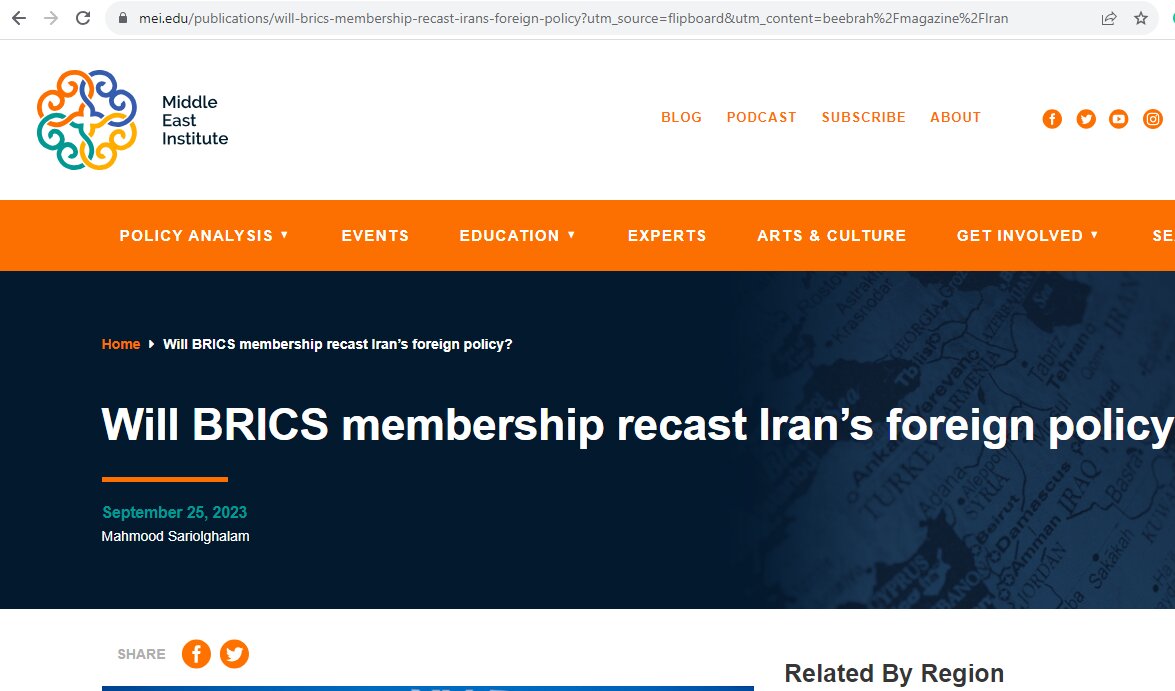Iran and BRICS in imagination of Western-minded!

TEHRAN- On September 25, the Middle East Institute (MEI) published an article titled, “Will BRICS membership recast Iran’s foreign policy?”, evaluating Iran's membership in BRICS from the point of view of Mahmood Sariolghalam.
Mahmood Sariolghalam, a professor and one of the advisers of the former president of Iran, Hassan Rouhani, is known as an extreme Western-minded analyst in Iran.
However, the best way to cool down after a tiring day is to read the articles written by Westernized thinkers against their homeland’s interests and in support of the U.S. and Europe.
These followers, with superficial arguments, want to make the West a hero at any cost and weaken the challenges that the West faces. Whether such an approach has benefits for them or is only related to their mental dependence is not the subject of this article’s main point, but it is funny that they have become more Catholic than the Pope. That is, Westerners themselves sometimes admit their failures, but their followers narrate the facts in a different way. Meanwhile, Iranian Western-minded analysts are in the forefront and despite being in the minority, by using the freedom of speech in the Islamic Republic of Iran, voice their beliefs.
Sariolghalam believes that Iran's membership in BRICS and the Shanghai Cooperation Organization (SCO) cannot tackle Iran's economic woes because the secondary sanctions of the United States place enormous limitations on Iran’s economic interactions coupled with Iran’s refusal to sign the Financial Action Task Force (FATF). So, Iran’s international financial transactions do not and cannot operate according to global procedures and standards.
The author points to Iran’s “economic malaise, and economic mismanagement”. This is while since Ebrahim Raisi took office as president, Iran has managed to grow economically, achieve great economic revenues, and export more oils through close cooperation with many countries including those party to the SCO and BRICS.
Referring to Iran's policies, the author says “Iran has declared that its political identity is contrary to that of the Western world. Its leadership has articulated an interest in maintaining commercial and technological relations with Western countries, but when it comes to politics and culture, all decisions and operations are molded by local tradition and mired in inertia.”
“Fear of overwhelming American and European soft power by the top echelons of such states is thus an essential factor in their decision to differentiate between commercial and non-commercial relations with Western countries. Consequently, to ensure a tighter grip on domestic control in China, Russia, and Iran, keeping the United States at bay is a priority for regime security,” the author wrote as the reasons for Iran, China, and Russia’s gathering together.
What has brought these three countries closer is more of the concern about the U.S. and security considerations rather than the connections that are related to their identity, according to the author.
To address the analysis on the MEI website, it can be said that nearly all countries have put trade and technology cooperation on their agenda like Iran and its Eastern allies, but in the case of culture and politics, it is the traditional structure of each country that adjusts relations with others in line with independence, security, and historical identity.
It is quite natural for great and civilized nations to resist the destructive cultural and political influences of the United States; no wise leader would allow the identity, independence and security of his country to fall under the conspiracies of the West, even if the westernized thinkers burn with anger!
Referring to the heterogeneity among the BRICS member countries, the author said that due to the lack of internal harmony among the BRICS members, Iran probably belongs to the camp that is afraid of the United States! He says “BRICS, like the SCO, seems to be more of a reflection of a political temperament than a structure for building consensus and collective action. Both organizations are fundamentally shaped by Chinese and Russian political motives to project power outside of America’s global reach, however ceremonial and ineffectual that may be. Neither organization enjoys internal harmony and commonality of purpose among its members.”
Insisting on the political nature of BRICS, stressing the heterogeneity and the fractions on the BRICS alliances, ignoring the growing economic and security interactions within the group, along with closing eyes on the de-dollarization and reduction of the global dominance of the United States are the outcomes of the mind of an extremely Western-minded thinker!
Even India, enjoying close relations with the United States, has recently conducted its exchanges with the United Arab Emirates, which is also a traditional ally of the United States, with local currencies without the involvement of the dollar; interestingly, India is one of the main members of BRICS and the UAE has recently been invited to the group.
The United States, Europe, and the West in general will have no choice but to accept the reality of the multipolar world with the influence of important alliances such as SCO and BRICS. Undoubtedly, the imagination of the author cannot save American unilateralism. In this regard, emerging powers like Iran, China, and Russia will definitely play a key role in accelerating the emergence of multipolarism and American decline.
Leave a Comment